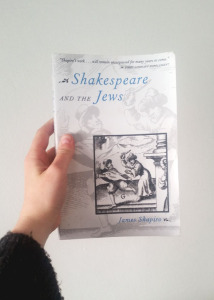
Genre: Nonfiction
Medium: Paperback
Synopsis: Shapiro undertakes a facet of history that has rarely been done so before: Jewish people in historic England. Inspired by Shakespeare’s The Merchant of Venice, Shapiro sets out to understand the history, myths, and cultural “facts” about Jewish peoples from the 1200s to 1700s. While most historians have simply either glossed entirely over this subject or ignored it completely, he understands that England’s history with Jewish folks and The Merchant of Venice are so culturally entwined that it’s impossible to let this subject sit untouched any longer.
Review: I found myself very impressed with Shapiro’s work. I picked this book up because I’m a fan of Shakespeare, and I’m a fan of learning more about cultures that aren’t my own. So, what better decision than to buy Shakespeare and the Jews? Though, be warned–this book is mostly about Shakespeare’s England and its reaction to Jewish folks rather than Shakespeare and The Merchant of Venice. That’s not to say that Merchant isn’t also heavily mentioned–but to fully understand everything at play (pun intended), we must also understand Shakespeare’s England’s anti-semitism. And that topic is one that hasn’t been discussed yet. Hence, Shapiro’s encompassing book.
In the time I spent reading this with my coffee, on trains, and in my classroom, I discovered that there was a lot I didn’t know about Jewish history. Of course, I knew what we’d probably consider the basics in a high school history class, but I think that just proves Shapiro’s point that nobody has really ever talked about this before. James Shapiro certainly had his work cut out for him, and I think he did a fantastic job of shedding light onto such an ignored subject.
He discusses the “pound of flesh” myth, the difficulties of Catholicism vs. Protestantism vs. Judaism, the history that led to the “wandering Jew” stereotype, and general anti-semitic anxieties of the time. One of the anxieties that truly shocked me was the reaction to a Jewish person converting to Catholicism. I would have thought that after converting and assimilating, there’d still be some worries, but overall–hey, they converted, right? Nope, not right. Because after they converted, well, how would real Englishmen know that they wouldn’t just convert back to Judaism after so easily converting to Catholicism? And how did they know that they weren’t just faking being assimilated. After all, they might be Catholic in public in order to save face, and remain Jewish at home.
Additionally, how does all this relate to Shylock and Jessica in Merchant? What with Jessica’s conversion, and Shylock’s want for Antonio’s pound of flesh. And even more interestingly is how Shylock became an actual figure in Shakespeare’s England–somebody published books whilst using Shylock’s name as a pseudonym.
It’s a big task, but Shapiro masterfully lays out how England affected Shakespeare himself, and how Shakespeare’s Merchant affected England right back.
Of course, Shapiro goes much more in depth about that topic than I’m willing to, but the amount of thought and care that he puts into each subject is incredible. Honestly, if you’re a fan of Shakespeare or want to know more about Jewish studies (and discover a multitude of various other authors and titles through Shapiro’s bibliography), I’d highly recommend Shakespeare and the Jews.
Advertisements Share this:




